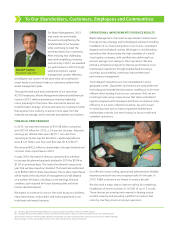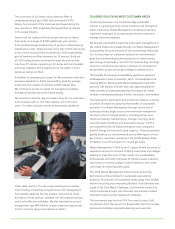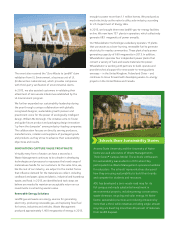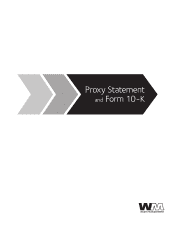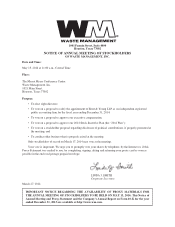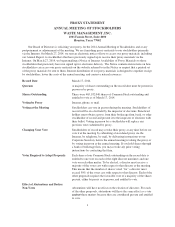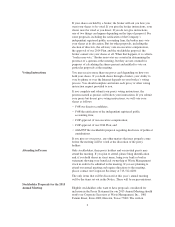Waste Management 2013 Annual Report Download - page 13
Download and view the complete annual report
Please find page 13 of the 2013 Waste Management annual report below. You can navigate through the pages in the report by either clicking on the pages listed below, or by using the keyword search tool below to find specific information within the annual report.
B
OARD OF
D
IRECTORS
Our Board of Directors currently has eight members. Each member of our Board is elected annually.
Mr. Reum is the Non-Executive Chairman of the Board and presides over all meetings of the Board, including
executive sessions that only non-employee directors attend.
Stockholders and interested parties wishing to communicate with the Board or the non-employee directors
should address their communications to Mr. W. Robert Reum, Non-Executive Chairman of the Board, c/o Waste
Management, Inc., P.O. Box 53569, Houston, Texas 77052-3569.
Leadership Structure
We separated the roles of Chairman of the Board and Chief Executive Officer at our Company in 2004. We
believe that having a Non-Executive Chairman of the Board is in the best interests of the Company and
stockholders. Over the past several years, the demands made on boards of directors have been increasing. This is in
large part due to increased regulation under federal securities laws, national stock exchange rules and other federal
and state regulatory changes. More recently, on-going market challenges and economic conditions have increased
the demands made on boards of directors. The Non-Executive Chairman’s responsibilities include leading full
Board meetings and executive sessions, as well as ensuring best practices and managing the Board function. The
Board named Mr. Reum Chairman of the Board effective January 1, 2012, due to his tenure with and experience
and understanding of the Company, as well as his experience on public company boards of directors.
The separation of the positions allows Mr. Reum to focus on management of Board matters and allows our
Chief Executive Officer to focus his attention on managing our business. Additionally, we believe the separation
of those roles ensures the independence of the Board in its oversight role of critiquing and assessing the Chief
Executive Officer and management generally.
Role in Risk Oversight
Our executive officers have the primary responsibility for risk management within our Company. Our Board
of Directors oversees risk management to ensure that the processes designed and implemented by our executives
are adapted to and integrated with the Company’s strategy and are functioning as directed. The primary means by
which the Board oversees our risk management structures and policies is through its regular communications
with management and our enterprise risk management process. The Company believes that its leadership
structure is conducive to comprehensive risk management practices and that the Board’s involvement is
appropriate to ensure effective oversight.
The Company initiated an enterprise risk management, or ERM, process several years ago, which is
coordinated by an ERM Committee consisting of our Chief Financial Officer, Chief Operating Officer, General
Counsel and Vice President – Internal Audit. This process initially involved the identification of the Company’s
programs and processes related to risk management and the individuals responsible for them. Included was a risk
assessment survey completed by senior personnel requesting information regarding perceived risks to the
Company, with follow-up interviews with members of senior management to review any gaps between their and
their direct reports’ responses. The information gathered was tailored to coordinate with the Company’s strategic
planning process such that the risks could be categorized in a manner that identified the specific Company
strategies that may be jeopardized and plans could be developed to address the risks to those strategies. The
Company then conducted an open-ended survey aligned with the objectives of the Company’s strategic goals
with several individuals with broad risk management and/or risk oversight responsibilities. Included in the survey
were the identification of the top concerns, assessment of their risk impact and probability, and identification of
the responsible risk owner. Finally, a condensed survey of top risks was completed by approximately 200 senior
personnel to validate the risks and the risk rankings.
The enterprise risk management program and process continue to evolve with enhancements made annually.
Board members are polled to collect their thoughts on significant risks facing the Company and how the
reporting format should be revised to improve management’s communication of enterprise risks to the Board.
4


